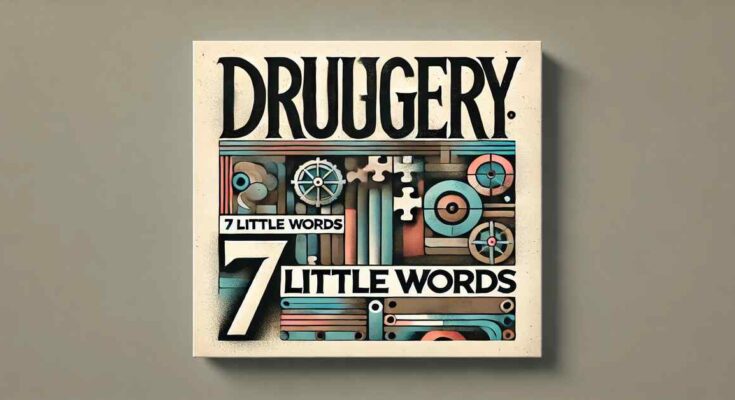Puzzle games have always been a favorite pastime for people of all ages. They challenge the mind, improve cognitive skills, and provide a sense of accomplishment when solved. Among the many puzzle games available, “7 Little Words” stands out for its unique blend of wordplay and problem-solving. However, some levels, like “Drudgery,” can be particularly challenging. If you’re stuck on this level or want to improve your puzzle-solving skills, this guide will provide you with strategies to solve “Drudgery 7 Little Words” quickly.
Contents
Understanding the Basics of 7 Little Words
Before diving into specific strategies, it’s essential to understand how “7 Little Words” works. The game presents you with seven clues and a set of letter groups. You aim to combine these letter groups to form words matching the given clues. Each puzzle has a theme, and the clues are often related. For example, the “Drudgery” level revolves around tasks or activities that feel monotonous or tedious.
The game’s charm lies in its simplicity but can also be deceptively tricky. The key to solving it lies in vocabulary knowledge, pattern recognition, and strategic thinking.
Step-by-Step Guide to Solving “Drudgery 7 Little Words”
1. Read All the Clues First
Start by reading all seven clues carefully. This will give you an overview of the theme and help you identify any obvious answers. For “Drudgery,” think about tasks or activities that are repetitive, boring, or labor-intensive.
2. Look for Short Words First
Short words are often easier to solve because they have fewer letter combinations. Identify clues that likely correspond to shorter words and focus on those first. This will give you a foothold in the puzzle and make tackling the longer, more complex clues easier.
3. Analyze the Letter Groups
Examine the letter groups provided. Look for common prefixes or suffixes, such as “un-,” “-ing,” or “-tion.” These can help you piece together words more quickly. For example, if you see a letter group like “ing,” it’s likely part of a verb in its present participle form.
4. Use the Process of Elimination
If unsure about a particular clue, try eliminating letter groups that don’t fit. This narrows your options and increases your chances of finding the correct combination.
5. Think Outside the Box
Sometimes, the answers aren’t straightforward. Consider synonyms, idiomatic expressions, or less common meanings of words. For “Drudgery,” think beyond the obvious and consider words that metaphorically represent tedious tasks.
6. Take Breaks if Needed
Step away from the puzzle for a few minutes if you’re stuck. A fresh perspective can often help you see solutions that weren’t apparent before.
7. Use Hints Sparingly
If you’re truly stuck, the game offers hints. However, they should be used sparingly to maintain the challenge and satisfaction of solving the puzzle independently.
Common Pitfalls to Avoid
- Overcomplicating the Clues: Sometimes, the most straightforward answer is correct. Don’t overthink the clues.
- Ignoring the Theme: The puzzle’s theme can provide valuable context for the clues. Always keep it in mind.
- Focusing on One Clue: Don’t get stuck on a single clue for too long. Move on to others and come back later.
Tips to Improve Your 7 Little Words Skills
- Expand Your Vocabulary: The more words you know, the easier it will be to solve the puzzles. Read books, articles, and other materials to learn new words.
- Practice Regularly: Like any skill, practice makes perfect. The more you play, the better you recognize patterns and solve clues.
- Play with Friends: Collaborating with others can make the game more enjoyable and help you see solutions you might have missed.
- Learn Common Word Patterns: Familiarize yourself with common prefixes, suffixes, and word roots. This will help you piece together words more efficiently.
Conclusion
It’s not necessary for solving “Drudgery 7 Little Words” to be a tiresome undertaking. By understanding the game’s mechanics, employing strategic thinking, and practicing regularly, you can easily tackle even the most challenging levels. Stay patient, take breaks when needed, and enjoy the process. Puzzle-solving is as much about the journey as it is about the destination.
FAQ
Q1: What is the best way to solve a 7 Little Words puzzle?
A: Begin by reading all the clues and identifying any apparent answers. Focus on shorter words first, as they are often easier to solve.
Q2: How can I improve my 7 Little Words skills?
A: Expand your vocabulary, practice regularly, and familiarize yourself with common word patterns, such as prefixes and suffixes.
Q3: What should I do if I’m stuck on a clue?
A: Take a break and come back later with a fresh perspective. You can also use hints sparingly if needed.
Q4: Are there any tools or resources to help solve 7 Little Words puzzles?
A: While the game is designed to be solved without external help, you can expand your word knowledge by using online dictionaries or thesauruses.
Q5: How important is the theme in solving the puzzle?
A: The theme provides valuable context for the clues. Remember this when solving the puzzle.



